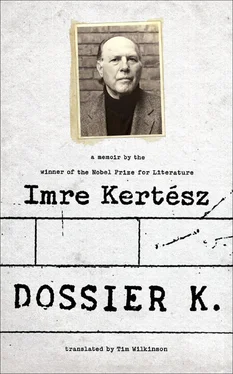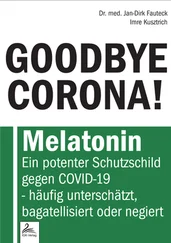What strikes me listening to you spinning these yarns is how it seems to have been a never-ending summer in the vicinity of Tömő Street, except for the one wintry afternoon when one of the Nellies took you to church .
That’s an astute observation. And the reason it may appear so, to you as to me, is because over the summer holiday I used to spend half the time with my father, as I have already said, and until he married Katie Bien, he lived with my grandparents. They, for their part, were in their businesses all day long, my grandparents in their shop, my father in his lumber store.
Your mother and father had divorced by then …
Maybe not as yet, but they had separated.
How old were you at this point?
Four or five, but even later on I used to spend half the summer with him up until I was ten, when my father found a place on Baross Street, still in Józsefváros, at the corner with what was then Thék Endre and is now Leonardo da Vinci Road.
And you have no memories of the holiday weeks you spent with your mother?
Of course I do. Mother always took me out of the city to some bathing resort. My strongest memories are of Erdőbénye and Parádfürdő. 1It’s hard to believe now, but those were then well-heeled, upper-middle-class spas with first-rate hotels that after the war were converted into “trade union holiday centres” and other institutions serving functions of that ilk, and then they were run down to the ground. Once, when we reached Erdőbénye, Mother had something still to sort out at the travel agent’s, and I spotted the dried-up bed of a stream nearby. I was curious about what there might be there and, broken loose from my mother’s proximity as I was, I started to run, then I slipped on a rock and slid down the steep bank into the channel of the stream and the rocks lining it. That limited our diversions, because for at least a week my cuts had to be dabbed regularly with iodine and the dressings changed. But look here, these anecdotes can be of no interest to anyone, me least of all.
In that case, let’s cut back briefly to Tömő Street, because you have said nothing about your grandmother .
No, I haven’t, but then there’s not much I can say about her, poor thing. By the time I came into the world, the youngest of the Hartmann girls had become a cantankerous old biddy. She was fat, hard of hearing, had trouble with her blood pressure and she continually complained either about her health or how they had “come down” in the world, with reference to the “palmy days.” Grandfather endured that without a word, even though it must have been most depressing; however, he would occasionally chide her with a “Zelma, you’re always gr oo mbling” — like that, pronouncing the “u” as “oo.” She would sometimes be overcome by bouts of lovingness when she would be all over me, smothering me with kisses, after which, as I recall — children can be horrid — I would wipe my face.
So, let’s pass from Tömő Street to Molnár Street and your maternal grandparents .
I never actually visited the place in Molnár Street; I only know the address because I heard about it from Mother.
In what connection?
She would sometimes bring up the subject of her young days; Molnár Street must have been a nightmarish memory for her. It was the crampedness of the space above all that stayed with her like some sort of claustrophobic memory.
Was that where she spent her childhood?
No, that was just a temporary residence to which they pulled back after fleeing from Cluj-Kolozsvár to Budapest.
When was that?
In 1919, after the Romanian forces occupied the city.
So up till then they lived in Kolozsvár. Can you say anything more about that? Do you know anything at all about your mother’s side of the family?
In truth, not a lot. My grandfather was a bank official at the Franco-Hungarian Bank in Kolozsvár. He was called Mór Jakab; he was an elegantly dressed, quiet, and handsome man with a silky moustache and a melancholy smile. He carried around with him the pleasant fruit scent of the nitroglycerin lozenges that he had to take for his heart disease and that he kept on him at all times in a graceful little box in a jacket pocket. I never knew Mother’s mother; after bringing her fourth daughter into the world she died from the physical exhaustion of childbearing, and Mother never forgave Bessie (the fourth girl) or, in practice, my grandfather for that, because Grandmother had contracted TB and the doctors forbade her from having any more children after the third.
That’s sad, but the poor girl could hardly be blamed for that …
That’s what I said to my mother.
And …?
Her response was that she also had other bad qualities.
Was she being ironical, or …
She steered well clear of irony; she didn’t have a spark of humour. On the other hand, she was deeply attached to her mother and took great exception to the fact that my grandfather remarried, though he did that precisely in the interests of the four girls; for him to have raised them on his own would undoubtedly have been beyond his energy, which was far from abundant.
In this case, unlike with your other grandfather, I am starting to get the feel of a likeable but slightly dissolute male figure .
You are probably not too wide of the mark. Piecing together all the things I heard from my mother, I also formed the impression that in the marriage between the two of them, the grandmother whom I never knew was most likely the dominant partner, only I have such a hazy grasp of the facts … There you are, a person is sick of family history all his life, and then just when it becomes important, he is left grubbing around in an unfamiliar past.
I have gathered from your writings that you’re not a great fan of stifling family secrets, or family life in general .
“Families, I hate you!” André Gide wrote. “Shut-in homes, closed doors, jealous possessions of happiness.” Yes, there was a time when I thought that the source of all psychological illnesses, and nearly all illnesses are psychological illnesses, was the family, or stifling family life, as you put it: the big, soft, musty marriage-bed which suffocates all life.
But you no longer think that way?
Look, my second wife, Magda, has a son, and he has a very nice wife, and the two of them have a little girl and a little boy …
And that’s forced you to take an easier-going approach .
There’s no denying it.
And now you regret not having taken a greater interest in the grandma you never knew .
All the more because among the relatives of that grandmother there were a lot of interesting people, one or two of whom left their stamp on university life in Cluj-Kolozsvár to the present day.
Who are you thinking of?
György Bretter, first and foremost, a philosopher and lecturer in literature who met an untimely death and may well have been a second cousin and in any case was almost certainly a kinsman. My grandmother’s name was Betty Bretter. Zsófi Balla, the young ethnic Transylvanian Magyar poet who now lives in Budapest, completed her university studies at Cluj-Kolozsvár and was a student of Professor György Bretter. When I brought up the matter of a family relationship, she said that the way I speak, my gestures, my whole “phiz” reminded her a little of György Bretter.
Did you ever try to establish any sort of contact with him?
Never. At first I shared André Gide’s opinion, and now I’m too late. As I said, he died when he was still young, and as far as I know he, too, died of TB, just like my Bretter grandmother. Incidentally, my mother also contracted a so-called “infiltrating” tuberculosis, of which she was fortunately cured around the mid-Thirties at the Irén Barát TB Sanatorium in Budakeszi. By then she had long been divorced from my father, but he still took me along to visit her on the “Magic Mountain” of Buda. We got on the cog-wheel railway in the Városmajor, a long way from Tömő Street, then on the way back we went for a walk on Swabian Hill into town. My father loved going on walks.
Читать дальше












